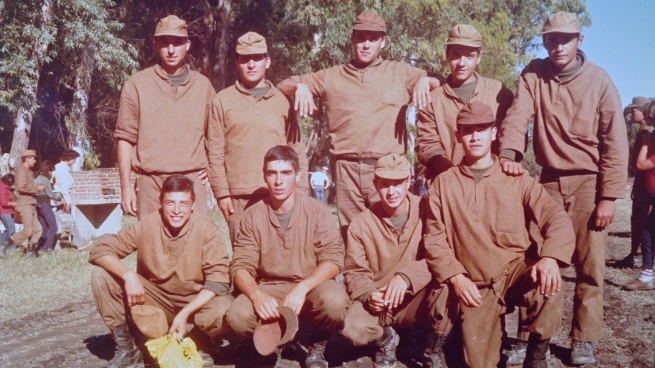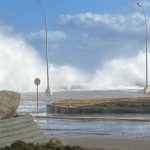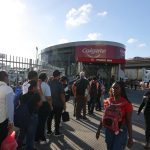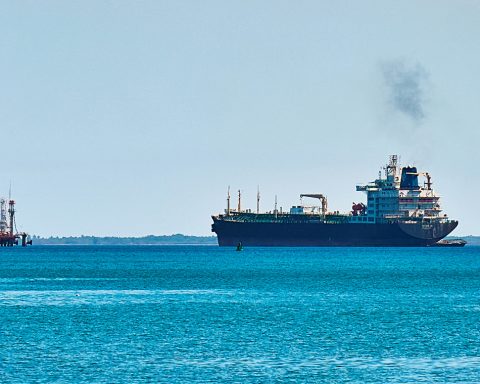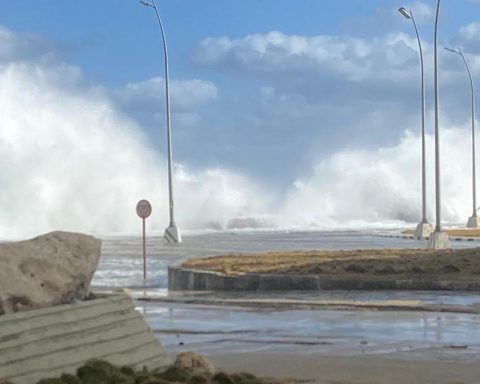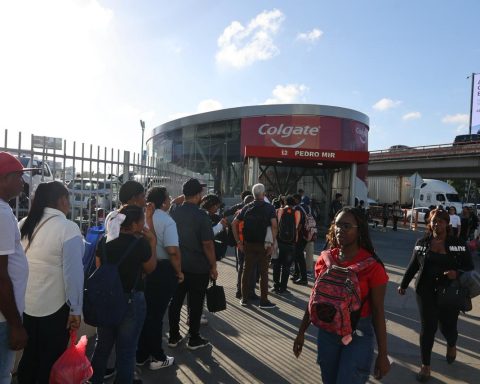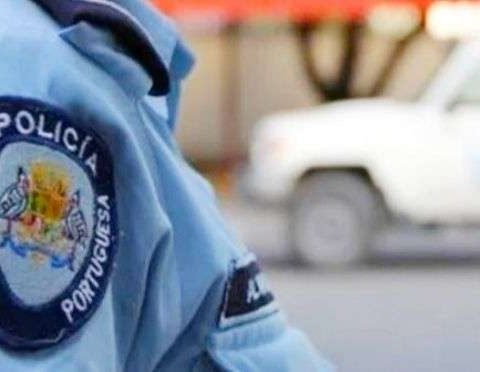Hundreds of letters, chains, rosaries, chocolates and cans, part of the parcels that relatives of combatants had delivered to the 7th Infantry Regiment of the city of La Plata with the promise that they would be taken to the soldiers fighting in Malvinas, were abandoned that fall of 1982 in a garbage dump in the town of Ensenada, according to a group of ex-conscripts entrusted to that operation under threat of “death penalty” if they ever revealed what happened, told Télam.
Sergio Regidor, Alfredo Marcelino, Daniel Laira, Ignacio Arauz, Darío Manzanares, Eduardo Piedrabuena, Jorge Cebrowski and Hugo Acuña -all of them class ’63- were part of the music band of this emblematic Army garrison, the unit with the largest number of suffered casualties during the war, with 36 killed and more than 150 wounded, and that it was the heroic protagonist of the longest and fiercest battle of the conflict, that of Mount Longdon.
At that time, the fervor for the defense of Argentine sovereignty over the islands that the regime had tried to radiate had managed to permeate a significant sector of society and the young people who at that stage made the “colimba”, as the Compulsory military service were no exception. So it was that the ’62 class conscripts proudly left for the war, while those born in ’63 remained in the regiment with the illusion of one day also having that honor.
“All the soldiers and most of the officers and non-commissioned officers undertook the trip to the islands in April. The Regiment, then, remained with the ’63 class and the non-commissioned officers of the band took charge of the companies. At that time, the music band, as such, was dismantled”, begins the Regidor story.
As the days and, later, the weeks of the conflict passed, the procession of relatives of combatants who approached the impassable gate located on 19th Avenue, almost at the corner of 51st, grew in search of news and to deliver parcels that, according to them, they had said, they would reach the islands at the hands of their children.
“I remember it perfectly; it was a sunny day and they met us to tell us that we were going to go out to do an operation, that it was going to be secret and that we couldn’t even tell our relatives what we were going to do,” says Regidor.
The thread is taken up by Arauz: “There were three Unimogs loaded with parcels. In another they made us get on,” he indicates. But that point in the story has a previous chapter, and it is another of the members of the band, Alfredo Marcelino, who, remembering and adding more pieces, says that only some of them had been summoned to load the packages onto the trucks. The others don’t; the others directly found themselves there, in the middle of the boxes, without knowing where they were going or what.
Thus, when reconstructing the story, they point out that an officer had been the one who gave the order to carry out that operation, under threat of death if they broke the silence about what happened. Meanwhile, First Sergeant Soria, non-commissioned officer in charge during the war in the Mechanized Infantry Regiment 7 “Coronel Conde”, had been in charge of the operation.

“When we headed towards the Ensenada side with the Unimogs, I was happy because I thought we would go to the port to load the parcels so they could go to Malvinas. But no, after walking for a while, not much, we arrived at a dump where we They made all the packages break. I remember that tears fell from my eyes, of anger, of impotence, “says Hugo Acuña in dialogue with Télam, while Sergio Regidor adds: “They were relatively small boxes, labeled with the names of the soldiers. They said that we had to take out the things that were inside and we kept separating them”.
Ignacio Arauz provides details: “Everything that was chains, crosses and rosaries, we had to put them in a big black bag, as if they were the consortium ones today, while the letters made us put them in another bag and the sergeant told us that they were going to give them to the soldiers when they came back. Everything else (clothes, chocolates and small souvenirs) was thrown in that dump, as were the wrappers with the names. The other two bags, the one with the little chains and the one with the letters, all mixed up and unidentified, we never saw them again”.
Luis Alberto Díaz, the martyr of the music band of the 7th Regiment of La Plata
Like Daniel Laira, Hugo Acuña, Sergio Regidor, Alfredo Marcelino, Ignacio Arauz, Darío Manzanares, Eduardo Piedrabuena and Jorge Cebrowski, Luis Alberto Díaz was a member of the music band of the 7th Infantry Regiment of the city of La Plata. However, like the other ’62 class conscripts, he had to change his instrument for a rifle and go to war.
Everyone remembers in great detail the day the soldiers left the regiment: the climate of fervor, pride and emotion seemed to invade everything. The night of the combatants’ return was also indelibly recorded on them, when the few who remained in the music band -dismantled after the conflict began, with the departure of those who were going to fight in Malvinas- formed and were the protagonists of a luck of welcome, already painful, with the war lost, and in the midst of the desperation of relatives who sought to find their children among the newcomers.

In the story they shared with Télam, in which they reconstructed what had happened the day everything that was in the parcels that relatives had delivered to be sent to those who were fighting in the Falklands was abandoned in a dump, Daniel Laira interjects a detail , an anecdote that also has a letter as the protagonist.
On the day the ’62 class conscripts were preparing to leave for the islands, a crowd had gathered at the regimental gate to see them off. Laira remembers: “In the midst of that tumult, a girl carrying a bag asked me if she could give it to Luis Alberto Díaz. I looked for him and, when I found him, he opened it in front of me. Between chocolates and alfajores he found a letter. ‘I’m going to be a dad,’ he told me when he read it”. Luis Alberto Díaz died on June 11, 1982, a few days after his 20th birthday, at the Battle of Mount Longdon.
Although there is a part of this history that is unknown, another is visible: in 1998, through Law 24,950, he was declared a national hero; meanwhile, in June 2018, a square in San Francisco Solano, in the Quilmes district of Buenos Aires, was renamed with his name, and a monument was inaugurated there in his honor, right in front of what had been the his family home.
A year earlier, in 2017, the remains of Luis Alberto Díaz -buried as NN in the Darwin Cemetery- had managed to be identified by the International Committee of the Red Cross. In fact, his mother, Rosa Campero de Díaz, who died in 2020, was part of the contingent of relatives of the fallen in Malvinas who, after that work, traveled to the islands in March 2018. It was thus, then, that a few years before he died, he had the -reparative- possibility of mourning his son next to his grave, there where his remains had lain for 35 years under the legend “Soldier only known to God.”
Meanwhile, Daniel Laira provides an essential piece of information: he says that, while this was happening in Regiment 7, he was on duty at the Command of the X Mechanized Infantry Brigade of the Argentine Army, located nearby, on Diagonal 80 between 41 and 116 , and that there was an open secret about the fate of the parcels, which ended up discarded in a dump. “We even learned that some of the trucks with the packages had been diverted to the house of an officer or non-commissioned officer. It was an aberrant thing,” he stresses.
Of course, as the years went by, what they had experienced that fall of 1982 in the 7th Regiment of La Plata, a place that had also worked, according to it was later tested as a clandestine detention center and as a command center for 18 other centers in area 113.

“These types of orders came from above; they were a ‘modus operandi’. They even discarded bodies and dumped them in the middle of the sea. So, for them, it was something usual: to make people and things disappear. And to us, with what they led us to do, they made us feel that we were betraying our comrades who were there fighting. All my life I felt that,” summarizes Hugo Acuña, who thus, in the midst of the sad puzzle that they managed to reconstruct, perhaps managed to put words to a sensation that he and his bandmates -today united by a bond of friendship- have kept tapping in their memories, over and over again, in these 40 years.
